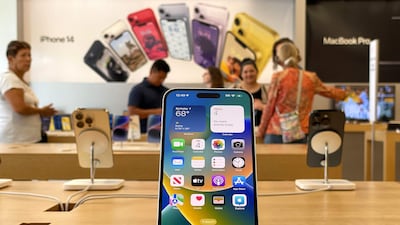Apple’s security ecosystem has received a slew of updates as the tech major keeps pace with demand for more robust protection on devices and services.
The updates, released at the California-based company's Worldwide Developers Conference in June, are designed to further safeguard users by incorporating “powerful” new protections on their devices.
These will be included in the latest versions of Apple’s operating systems, expected to be rolled out in September alongside the launch of the next iPhone. The National tried a number of these features on the latest public beta version of iOS 17.
Securely surfing Safari
To prevent unwanted access by other users sharing a device, private browsing windows on Safari, Apple’s web browser, will lock by default.
This allows a user to keep tabs open and come back to them by unlocking with Face ID, Touch ID or a passcode.
Apple will also introduce a feature that will stop tracking in Safari: private browsing will completely block known trackers from loading on pages visited.
Another feature, called link tracking protection, will remove “trackers”, or the gibberish set of characters appended to the URLs of sites visited.
Picture-perfect permissions
Apple has created a new permission protocol that prevents apps from accessing certain data from a device.
For example, because giving apps permission to access the photo library means potentially giving up lots of sensitive information, Apple will allow access only to specific photos that users choose by letting apps embed a photo picker.
On screen sharing, or sharing content across multiple displays of Apple devices, a new system interface has been built for Macs that gives better transparency and control over when a screen is shared and what parts of it are shared.
This will allow for even easier screen-sharing, while leaving out content that users do not wish to show.
Apple will also be rolling out new tools for developers, which are intended to give them more information on the data practices of their partners so they can provide more accurate privacy nutrition labels, which are the information Apple provides on how apps handle user data.
Sensitive content warnings
In 2021, on iOS 15.2, Apple introduced Communications Safety, which detected highly sensitive or inappropriate images and videos – nudity, in particular – being sent from or received in iMessages, in order to prevent children from viewing them.
In iOS 17, Apple has boosted this in the form of a Sensitive Content Warning, which basically extends the feature to AirDrop, FaceTime and contact posters on the phone app.
Sensitive images are scanned and detected within the device, meaning that no indication of the detection of these leaves the device and Apple does not get access to the messages.
Communications Safety and the upcoming Sensitive Content Warning are both opt-in features that can be toggled within settings. The former has only been available in select countries, but it will now be available globally. Also, later this year, it will be activated by default for users under 13 years old.
It is unclear whether this feature will be extended to third-party apps, as it is only currently available for Apple’s native apps. But the company is working with certain developers by sharing with them the underlying technology it uses for on-device detection.
Watch on automatic lockdown
Lockdown Mode, which Apple introduced last year to help protect users from state-sponsored cyber attacks, has been extended to provide even more high-level protections.
On iOS 17, it will now be able to block automatic connections to 2G cellular networks and automatic joining of Wi-Fi networks that are potentially insecure, as well as unsafe media sharing and PDF viewing, among others.
Additionally, turning on Lockdown Mode on an iPhone automatically activates it on a paired Apple Watch, with notifications also sent to any Macs and iPads of the specific user to ensure end-to-end protection.
Sharing is caring (for privacy)
AirDrop, Apple’s proprietary wireless sharing service, will feature Name Drop, which allows one-to-one sharing of contact details by holding iPhones near each other, ensuring that information is shared only with the intended recipient. Photos and website links may also be shared using this method.
Live Voicemail, meanwhile, will let users see a live transcription from a caller who starts to leave a message, without answering the call. At any time this is happening, the user can opt to pick up the call.
The logic behind this is that Live Voicemail helps stop scam and spam calls using on-device processing, according to Apple: calls identified as such won’t appear as Live Voicemail, and will be declined.
An additional feature, Silence Unknown Callers, will redirect calls from unknown numbers to Live Voicemail without ringing.
Vision Pro
Vision Pro, Apple’s first dive into the mixed reality headset race, promises to protect user privacy, according to Apple, sharing the same security features the company uses such as privacy permissions, data protection camera, microphone indicators and privacy nutrition labels.
The device has Optic ID, which Apple says is a new secure authentication system that allows a user to instantly unlock the device and authorise purchases.
Apple guarantees data is encrypted, meaning it never leaves the device and is accessible only to the secure enclave processor.
Its eye tracking is designed to protect where a user looks while using apps before interacting with any content. Data using this isn't shared with Apple or third-party apps or websites, as it is processed at the system level.


